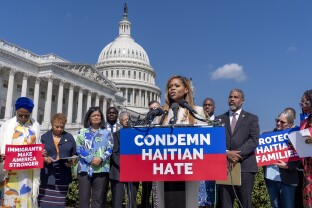Just weeks from Donald Trump’s inauguration, Haitian migrants across the country are anxious that one of his first actions in office will be to revoke their legal status, immigration advocates say.
Roughly 500,000 Haitians live in the United States under Temporary Protected Status, per NBC — a status that was initially granted in 2010 in the aftermath of a devastating earthquake. Their legal status has been extended amid worsening political turmoil. Trump said he would do away with the protections if reelected.
“Absolutely. I’d revoke it, and I’d bring them back to their country,” Trump said in an October interview with NewsNation.
Biden, facing pressure from lawmakers and advocates last spring, extended Temporary Protected Status for Haiti to last until Feb. 3, 2026, acknowledging the “extraordinary” conditions migrants would face if sent back. The Caribbean country has plunged into a debilitating crisis with gangs controlling more than 80% of its capital.
“There is fear everywhere within the Haitian immigrant community,” said Guerline Jozef, executive director of the Haitian Bridge Alliance. “With just one executive order, Trump can end Haiti’s protected status at any time before it’s scheduled to.”
Trump and Vice President-elect JD Vance vilified Haitian migrants specifically on the campaign trail, peddling debunked claims during their campaign that Haitian immigrants living in Springfield, Ohio, were eating pets.
Advocates are preparing for TPS designation for Haiti to end early. Beginning in mid-December, Haitian Bridge Alliance launched an ongoing series of town hall sessions in regions with dense Haitian migrant populations like Ohio, New York and California to address the possibilities. In partnerships with local Haitian community centers, town hall organizers are seeking to inform migrants about how to prepare for potential deportation or encounters with Immigration and Customs Enforcement officers, as well as the legal pathways available to them. In the coming weeks, Haitian Bridge Alliance says town halls will be held in Florida, Louisiana, Massachusetts and the Washington, D.C., area.
Each meeting also includes trauma-relief professionals who provide guidance on the upkeep of migrants’ mental well-being as they digest “heavy and scary” information, Jozef said.
“These people actually don’t know what will happen to their lives,” Jozef said. “They have fled extreme conditions to get to the U.S. in search of safety and protection for the same government to turn around and persecute them and once again, make them feel like they have nowhere safe to be.”
A spokesperson at the Columbus Haitian Center, a local Haitian Bridge Alliance partner assisting with town halls, said “everybody is praying [Trump] will change his mind.”
Advocates are encouraging as many Haitian noncitizens as they can to apply for permanent asylum and to explore different paths to legal status. Some have been able to secure a more permanent immigration status through family reunification and marriage.
“Haiti is a mess,” the spokesperson said. “TPS is definitely a layer of protection and is something that can help for a period of time, but the people really want to just stay in America permanently. And they have a good record.”
The Trump transition team did not respond to a request for comment.
Asked to clarify Trump’s position on TPS after the election, spokesperson Karoline Leavitt said in a statement to the Christian Science Monitor that voters gave Trump “a mandate” to follow through on campaign promises. She did not directly address his position on temporary immigration status.
Immigration advocates do feel a little more prepared to fight against Trump’s immigration agenda during his second administration. In his first term, Trump ended the protected status of a host of countries, including Haiti. The Department of Homeland Security at the time justified the decision, arguing that the conditions from the original disaster which triggered TPS had improved enough for it to expire. But, through litigation in 2018 — some through Haitian Bridge Alliance — Haitians were able to hold on to their protected status.
“We were right there to counter that decision from President Trump to protect our community and many others the first time,” Jozef told NOTUS. “This is one of the processes we are ready and willing to take on when and if the Trump administration were to move forward with what they’ve now promised to do multiple times.”
—
Calen Razor is a NOTUS reporter and an Allbritton Journalism Institute fellow.
Sign in
Log into your free account with your email. Don’t have one?
Check your email for a one-time code.
We sent a 4-digit code to . Enter the pin to confirm your account.
New code will be available in 1:00
Let’s try this again.
We encountered an error with the passcode sent to . Please reenter your email.


